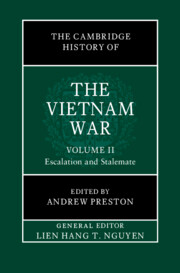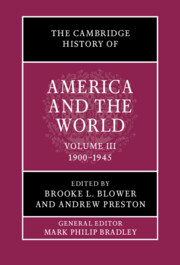51 results

The Cambridge History of the Vietnam War
- Coming soon
-
- Expected online publication date:
- September 2024
- Print publication:
- 30 September 2024
-
- Book
- Export citation
10 - American Internationalism
- from Part I - Imperial and Postcolonial Settings
-
-
- Book:
- The Cambridge History of Nationhood and Nationalism
- Published online:
- 08 November 2023
- Print publication:
- 09 November 2023, pp 210-232
-
- Chapter
- Export citation
The Emperor Is Dead—Long Live the Empire: The Enduring Legacy of the Imperial Presidency
-
- Journal:
- Modern American History / Volume 6 / Issue 2 / July 2023
- Published online by Cambridge University Press:
- 07 August 2023, pp. 259-264
-
- Article
-
- You have access
- Open access
- HTML
- Export citation
David A. Hollinger, Christianity’s AmericanFate: How Religion Became More Conservative and Society More Secular,Princeton, Princeton UniversityPress, 2022, 216 p.
-
- Journal:
- Annales. Histoire, Sciences Sociales / Volume 78 / Issue 1 / March 2023
- Published online by Cambridge University Press:
- 01 August 2023, pp. 205-207
- Print publication:
- March 2023
-
- Article
- Export citation
Part I - American Power in the Modern Era
-
- Book:
- The Cambridge History of America and the World
- Published online:
- 12 November 2021
- Print publication:
- 03 March 2022, pp 35-290
-
- Chapter
- Export citation
Contributors to Volume III
-
- Book:
- The Cambridge History of America and the World
- Published online:
- 12 November 2021
- Print publication:
- 03 March 2022, pp xi-xii
-
- Chapter
- Export citation
Index
-
- Book:
- The Cambridge History of America and the World
- Published online:
- 12 November 2021
- Print publication:
- 03 March 2022, pp 723-762
-
- Chapter
- Export citation
Part III - The Perils of Interdependence
-
- Book:
- The Cambridge History of America and the World
- Published online:
- 12 November 2021
- Print publication:
- 03 March 2022, pp 497-722
-
- Chapter
- Export citation
Copyright page
-
- Book:
- The Cambridge History of America and the World
- Published online:
- 12 November 2021
- Print publication:
- 03 March 2022, pp iv-iv
-
- Chapter
- Export citation
Figures
-
- Book:
- The Cambridge History of America and the World
- Published online:
- 12 November 2021
- Print publication:
- 03 March 2022, pp viii-ix
-
- Chapter
- Export citation
Introduction to Volume III
-
-
- Book:
- The Cambridge History of America and the World
- Published online:
- 12 November 2021
- Print publication:
- 03 March 2022, pp 8-34
-
- Chapter
- Export citation
Maps
-
- Book:
- The Cambridge History of America and the World
- Published online:
- 12 November 2021
- Print publication:
- 03 March 2022, pp x-x
-
- Chapter
- Export citation
Part II - Competing Perspectives
-
- Book:
- The Cambridge History of America and the World
- Published online:
- 12 November 2021
- Print publication:
- 03 March 2022, pp 291-496
-
- Chapter
- Export citation
Contents
-
- Book:
- The Cambridge History of America and the World
- Published online:
- 12 November 2021
- Print publication:
- 03 March 2022, pp v-vii
-
- Chapter
- Export citation
Outbreak of severe acute respiratory coronavirus virus 2 (SARS-CoV-2) in hospitalized hemodialysis patients: An epidemiologic and genomic investigation
- Part of
-
- Journal:
- Infection Control & Hospital Epidemiology / Volume 44 / Issue 2 / February 2023
- Published online by Cambridge University Press:
- 06 December 2021, pp. 332-334
- Print publication:
- February 2023
-
- Article
- Export citation

The Cambridge History of America and the World
-
- Published online:
- 12 November 2021
- Print publication:
- 03 March 2022
11 - Standards for a Righteous and Civilized World: Religion and America’s Emergence as a Global Power
-
-
- Book:
- Christianity and International Law
- Published online:
- 17 May 2021
- Print publication:
- 20 May 2021, pp 223-245
-
- Chapter
- Export citation
Anxiety reduction after pre-procedure meetings in patients with CHD
-
- Journal:
- Cardiology in the Young / Volume 30 / Issue 7 / July 2020
- Published online by Cambridge University Press:
- 05 June 2020, pp. 991-994
-
- Article
- Export citation
Introduction
-
- Journal:
- National Institute Economic Review / Volume 250 / November 2019
- Published online by Cambridge University Press:
- 01 January 2020, pp. R2-R6
- Print publication:
- November 2019
-
- Article
- Export citation
Clinical predictors of conversion to bipolar disorder in a prospective longitudinal familial high-risk sample: focus on depressive features
-
- Journal:
- Psychological Medicine / Volume 48 / Issue 10 / July 2018
- Published online by Cambridge University Press:
- 07 November 2017, pp. 1713-1721
-
- Article
- Export citation



